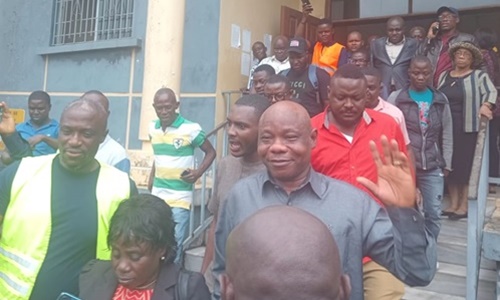NEW YORK, USA – In a historic first address to the United Nations General Assembly on Wednesday, September 25, 2024, Liberia’s President Joseph Nyuma Boakai stressed the importance of global unity, peace, and sustainable development. Speaking at the 79th Regular Session of the UN in New York, Boakai reflected on Liberia’s democratic progress and its longstanding commitment to the UN’s mission, while calling for urgent reforms to meet evolving global challenges.
Addressing world leaders, President Boakai praised Liberia’s peaceful democratic transitions, describing the country’s democratic culture as a model for others. “Liberia is proud to stand before this esteemed body, having achieved an uninterrupted back-to-back democratic transition,” Boakai said. He credited Liberia’s adherence to democracy as key to ensuring peace and stability, following years of civil conflict.
Reflecting on the United Nations’ mission established nearly 80 years ago, Boakai questioned whether the world had fully realized the ideals of dignity and human worth laid out in the UN Charter. He emphasized that, despite progress, the world remains beset by new challenges—greed, poverty, drug epidemics, climate change, and the unchecked power of social media.
“The world has changed, and the frontiers that we now embrace are different,” Boakai stated. “We must rethink our approach to global peace and security, adapting the United Nations to respond effectively to the realities of our time.”
Liberia’s Vision 2030, which aligns with the Sustainable Development Goals (SDGs), featured prominently in Boakai’s remarks. He highlighted the nation’s efforts to tackle poverty and improve access to essential services, emphasizing the importance of agriculture, infrastructure, and health. Despite these efforts, Boakai acknowledged that Liberia still faces significant challenges, with over half the population living below the poverty line.
Boakai’s address placed a special focus on Liberia’s ARREST Agenda—a comprehensive development strategy aimed at addressing the social and economic needs of the population, particularly the youth. “With 60% of our population being youth, we must ensure that they benefit from the dividends of democracy,” he said.
A passionate call for justice also defined Boakai’s message. He hailed the establishment of Liberia’s War and Economic Crimes Court, noting that Liberia is taking significant steps toward confronting its conflict past and achieving reconciliation. The president called on the international community to support Liberia’s pursuit of justice and accountability.
On the global stage, Boakai addressed pressing security issues, including the drug crisis threatening Liberia’s youth and regional instability in West Africa. He urged the international community to help combat the international drug epidemic and called for stronger regional cooperation through ECOWAS to address terrorism and political instability.
Boakai also voiced support for a ceasefire in the Middle East and a peaceful resolution to the war in Ukraine, stressing the importance of protecting territorial integrity and civilians.
The president concluded with a powerful bid for Liberia’s non-permanent seat on the UN Security Council in 2026. “Liberia is prepared to work with global partners to promote peace, justice, and security on the Security Council,” he affirmed, expressing hope that the international community would support Liberia’s candidacy.
As Liberia continues its journey toward sustainable growth and global cooperation, Boakai’s address left a resounding message: the future of global peace, prosperity, and human dignity is one that must be built collectively—leaving no one behind.
In closing, Boakai reaffirmed Liberia’s commitment to the United Nations and multilateralism, declaring, “Our future is rooted in unity, fairness, and shared values. Together, we can create a more peaceful and dignified world for everyone.”







